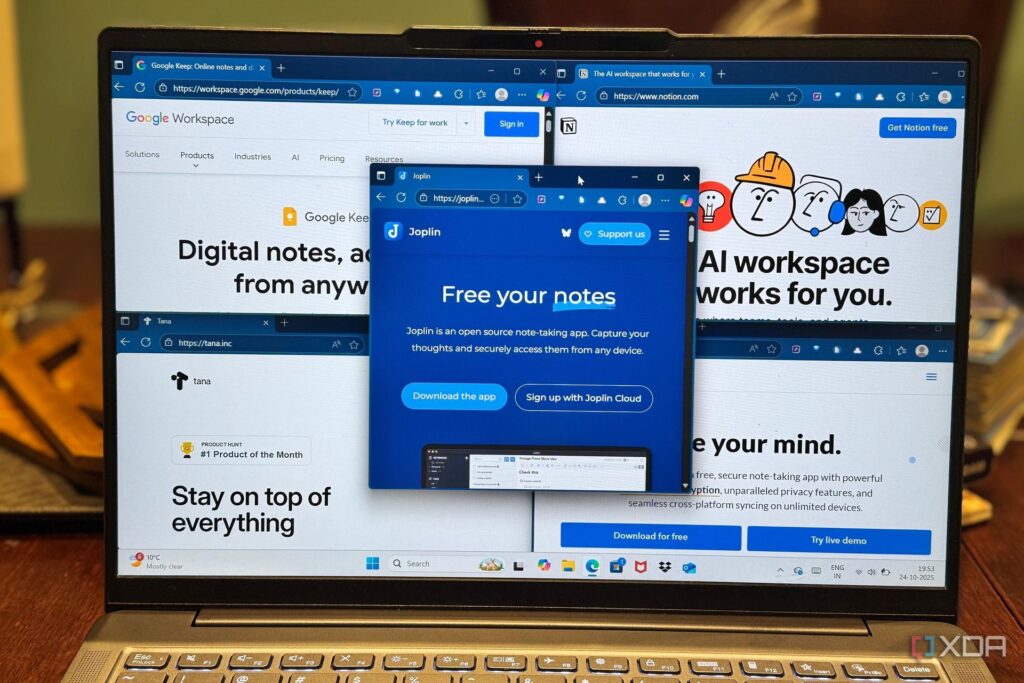
The proliferation of productivity tools has led users to explore alternatives that may offer better performance than Microsoft’s OneNote. While OneNote has been a staple for many, users are increasingly turning to five specific tools that promise enhanced organization, efficiency, and ease of use. These alternatives are designed to improve how individuals manage their notes and projects, moving beyond the limitations of OneNote’s structure.
Joplin: A Flexible, Open-Source Solution
Joplin stands out as a compelling alternative to OneNote, particularly due to its open-source nature. Unlike OneNote, which relies heavily on Microsoft’s OneDrive for storage, Joplin allows users to store their notes as plain Markdown files. These can be synced through various services such as Dropbox, OneDrive, or even a personal WebDAV server. This flexibility empowers users to control their data storage without being locked into a specific format.
The organizational capabilities in Joplin closely mirror those in OneNote, featuring notebooks and sub-notebooks for clear hierarchies. However, Joplin excels with reliable tagging and a powerful search functionality that indexes content effectively. Users can create project notebooks, tag related notes, and retrieve relevant information quickly, eliminating the frustration of navigating through nested sections. Additionally, Joplin’s cross-device syncing is robust, ensuring changes are reflected seamlessly across all platforms.
Notion: Structured Databases for Efficient Workflows
Notion offers a different approach by replacing OneNote’s freeform structure with structured databases that adapt to various types of information. This tool allows users to create dedicated databases for meetings, projects, and resources, each following a consistent template. The flexibility of Notion enables the same information to be viewed in multiple formats, such as calendar, kanban, or table.
The syncing experience in Notion is notably superior to OneNote, with changes updated in real-time across desktop and mobile platforms. The mobile app is user-friendly, making it easier to capture and review notes on the go. Collaboration features, including real-time editing and comments, enhance team productivity, making Notion a viable option for group projects. Although Notion operates on a proprietary format, it offers extensive export options and an API for creating custom tools, facilitating user adaptability.
Tana: Dynamic Outlining for Knowledge Management
Tana introduces a unique model that contrasts sharply with OneNote’s page-based approach. It operates on an outlining system where everything is organized into nodes, allowing for advanced querying capabilities. This means users can create dynamic views that automatically display tasks, insights, or relevant contacts without the need for manual updates.
The concept of “supertags” in Tana elevates basic tagging into a sophisticated knowledge management system. Each supertag can carry specific properties, enabling users to query notes in innovative ways. While the initial learning curve may be steep, particularly for those accustomed to OneNote’s freeform style, Tana’s structured flexibility can significantly enhance long-term project and knowledge management.
Standard Notes: Minimalism Meets Security
For those who seek simplicity, Standard Notes offers a minimalist interface focused on the essential functions of note-taking and retrieval. Its straightforward design eliminates unnecessary features while providing a reliable nested tagging system and effective search functionality. This design ensures notes are easily accessible without overwhelming users with complexity.
A key differentiator for Standard Notes is its security. All content is encrypted by default, ensuring that even the service’s servers cannot access the user’s data. This level of privacy is particularly appealing for sensitive information such as medical notes or personal journals. While it may not replace more complex systems like Notion for database management, Standard Notes excels in providing a secure and efficient note-taking experience.
Google Keep: Fast, Straightforward Note Capture
Google Keep exemplifies the principle that sometimes less is more. With no nested sections or intricate features, it focuses on delivering a fast and efficient note-taking experience. The rapid search capabilities significantly reduce the likelihood of misplacing information, a common challenge with OneNote’s complex structure.
The simple color-coding and labeling system in Google Keep provide just enough organization for quick thoughts and reminders without demanding excessive categorization. Its integration with Google Workspace enhances usability, allowing for smooth sharing and collaboration on notes and lists. For tasks requiring quick capture and retrieval, Google Keep often outperforms OneNote by delivering straightforward functionality effectively.
Moving Beyond OneNote’s Limitations
For users looking to enhance their note-taking experience, transitioning from OneNote to these alternatives can yield significant benefits. Adopting a new tool while retaining OneNote as an archive can help maintain access to past notes without the clutter. Over time, users can focus on migrating relevant notes to their new platform, leaving behind information that no longer serves a purpose.
By incorporating tools like Joplin for structured organization, Notion for collaborative projects, and Google Keep for quick captures, users can streamline their workflows and improve their productivity. As the digital landscape evolves, finding tools that align with personal work styles is essential for effective information management.






